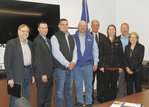


ST. PAUL, Minn. — Each year since 1981, Minnesota Milk Producers Association has brought dairy farmers to the Capitol to meet with representatives and senators.
This year’s Dairy Day at the Capitol, held March 7 in St. Paul, connected 60 MMPA members with legislators. They shared their stories and concerns about dairy farming and received updates about the ways government is working on their behalf.
Luke Sjostrom is the executive director for MMPA. He said it is important to have farmers meet with legislators to personalize dairy industry issues.
“The farmers come to tell their stories like only they can,” Sjostrom said.
Jacob Twohey milks 250 cows near Stewartville. This was the second consecutive year that he attended the event.
“I chose to attend to stay informed on current legislative issues facing the dairy industry and to help advocate for dairy to our lawmakers,” Twohey said. “DDC is an all-around valuable day, as it allows dairy farmers to stay informed on current issues, provides a face for the dairy industry and helps keep dairy on the minds of our lawmakers when legislation passes their desk.”
Bob Dombeck said he has attended around 10 times. A dairy farmer from the Perham area, he milks 360 cows with his brother and brother-in-law. This year, Dombeck’s daughter accompanied him for the first time.
“I brought my daughter, Taylor, to show her how the government works in St. Paul,” Dombeck said.
Like Twohey, Dombeck said having farmers meet with legislators helps shine a light on dairy issues.
“I see value in meeting with our representatives to discuss the issues that we see daily on our farms because if we don’t, they will never know about them,” Dombeck said. “We can explain to them how it personally affects us. It is good to go and talk to our legislators so that they know our concerns and priorities that may help or negatively affect us.”
Rep. Paul Anderson, who represents District 12A in west central Minnesota, attended the event and heard from farmers about a variety of topics, among them milk prices.
“We usually talk about the price squeeze facing those who milk cows,” Anderson said. “That’s more of a federal issue, and milk pricing can get complicated. We all agree that current milk prices don’t fully cover the cost of production.”
Capacity, Anderson said, is another concern shared by dairy farmers, especially when they look to the future of their farm.
“I have heard on many occasions that Minnesota’s milk processing capacity is full and cannot accept any more milk from (producers),” Anderson said. “That makes it difficult when a son or daughter wants to return home to the family farm, and they would like to add cows to the herd. They can’t find a home for any increased production they may want to add.”
Anderson said he appreciates the opportunity DDC offers for making connections with farmers.
“I enjoy Dairy Day because it gives legislators a chance to visit with folks who are actually involved in the dairy industry,” Anderson said. “We visit, usually in a small group setting, and can hear about their issues and what they would like us to do about them. We get to know them better, and they can put a face to the name and hopefully feel more at-ease when calling or writing us in the future.”
In a press release through MMPA, Sjostrom stressed the goal of DDC.
“We believe it is important for our members to have the opportunity to meet with their legislative representatives to discuss pending legislation that may have a direct impact on their families and farms,” Sjostrom said. “We appreciated the willingness of our legislative representatives to meet with us to discuss important issues. We believe it is always time well spent to take a day or two off the farm to help bridge understanding between the farming community and others.”
Sjostrom also shared a current focus of MMPA efforts.
“Our top priority at this time is to be sure policies and regulations are science-based and do not put unnecessary burdens on farms doing business in Minnesota,” Sjostrom said.
DDE’s face-to-face meetings have led to positive impacts on dairy policy, Sjostrom said.
“We continue to have a great turnout of over 50 farmers each year, and that has a tremendous beneficial impact on dairy rules and laws in Minnesota,” Sjostrom said. “For an example, a comment made by the Groetsch family about the (value) of robots turned into a benefit of extra points on Livestock Investment Grants.”
Personal input from farmers like the Groetsch family sticks with legislators as they make decisions about regulations and policies that shape the state’s dairy industry.
Twohey said the state’s budget might be less than helpful this year.
“My main takeaway from this year’s DDC is that many lawmakers are sympathetic to issues the dairy industry is facing but are reluctant to support additional spending with a forecasted deficit for the next fiscal year,” he said.
The evening before DDC, MMPA held its annual Dairy Dinner at the St. Paul Hotel, celebrating dairy and naming this year’s award winners for the organization.
The Producer of the Year Award went to Kerfeld Hill-View Farms near Melrose, a 250-cow dairy that has adopted conservation practices.
Legislator of the Year went to Sen. Aric Putnam, who is chair of the state’s Agriculture, Broadband, and Rural Development Committee.
The Bruce Cottington Award, named for its first recipient in 2006, was given to Brad Rugg of Owatonna for his years of service to 4-H and the dairy community. Rugg delivered a speech at the event about how investing in purple-ribbon kids positively impacts the future of dairy.
“(The annual Dairy Dinner) is always a special time when we can come together as an industry to celebrate the good work we do as individuals and as an organization,” Sjostrom said in a press release.
MMPA also held its annual member meeting March 6.
Aaron Vogt retired from his board position, and Garrett Luthens and Rick Smith were reelected to the board. Also, leadership positions on the executive board were restructured. Positions are filled as follows: Garrett Luthens, president; Shelly DePestel, vice president; Sadie Frericks, secretary; and Rick Smith, treasurer. Anthony Anderson and Tom Walsh will also serve as board members.
Comments
No comments on this item Please log in to comment by clicking here